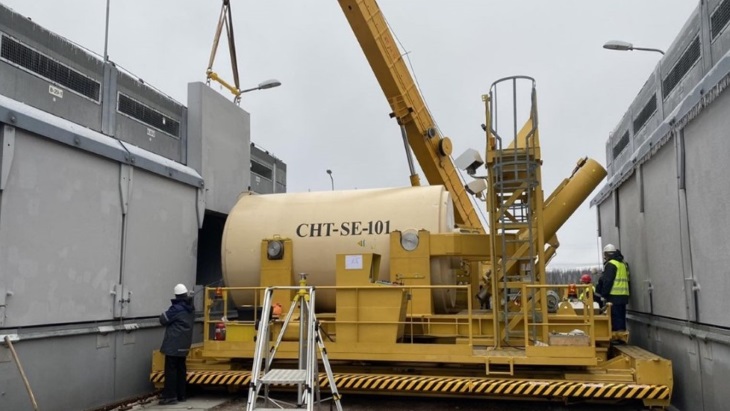The principal contractors on the ISF-2 facility project are Ukraine's UTEM, Germany's BNG and Italy's Maloni. The project, supported by the Nuclear Safety Account managed by the London-headquartered European Bank for Reconstruction and Development, will provide for the processing and storage of the used nuclear fuel from units 1, 2 and 3, which is required for the decommissioning of the Chernobyl plant.
Completion of cold testing was marked by the demonstration on 29 August of full functionality of the facility with no major issues or impediments to its licensed operation, Holtec said. This was confirmed at a working meeting by State Nuclear Regulatory Inspectorate of Ukraine on 6 September.
ISF-2 will formally enter commissioning once the operator - Chernobyl Nuclear Power Plant (ChNPP) - obtains an individual operation licence from the regulator. This will initiate the campaign to dismember each of Chernobyl’s more than 21,000 fuel assemblies into three parts - two fuel bundles and an activated connecting rod - in a purpose-built ‘hot cell’ and place them in interim dry storage.
Holtec took over the project 13 years after Areva had started it in 1998, and began work to develop a fully functional facility using the legacy systems, structures and components (SSCs) supplied by the French engineering company, and acquiring new replacement systems, as needed, from France, Germany, Italy and the USA, among other countries.
"The seemingly endless slog of modifying and developing replacement SSCs that could work within the constraints of the partially built and aging facility, followed by qualifying, licensing, manufacturing and testing them turned out to be an interminably long and tedious process," Holtec said. "The site acceptance tests involving 110 individual and 46 integrated tests including an astonishingly large number of SSCs (more than a thousand), punctuated by the discovery of hidden defects and obsolescent parts, was finally completed by April of this year."
Cold tests, which began on 6 May, encompassed every SSC and "every conceivable scenario" that may be encountered by the facility's operator, including normal operations, remotely executed maintenance of activated equipment, suitability assessment of the auxiliary systems needed to control worker exposure and spread of contamination, and response to anomalous or emergency developments.
ChNPP and Holtec are in the process of closing out the documentations and handing over the facility to the owner to begin commissioning followed by production loading.






_63865.jpg)
_18570.jpg)
_16159.jpg)





